- Clone
- A17065A (See other available formats)
- Regulatory Status
- RUO
- Other Names
- Apolipoprotein E, APO-E, Alzheimer Disease 2, LDLCQ5, APOE, LPG, AD2
- Isotype
- Mouse IgG2b, κ
- Ave. Rating
- Submit a Review
- Product Citations
- publications
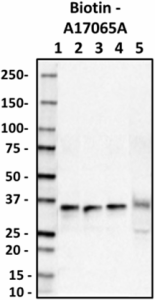
-

Western blot of Biotin anti-Apo E, 154-162 antibody (clone A17065A). Lane 1: Molecular weight marker; Lane 2: 40 ng of Apo E2 recombinant human protein; Lane 3: 40 ng of Apo E3 recombinant human protein; Lane 4: 40 ng of Apo E4 recombinant human protein; Lane 5: 40 µg of human plasma. The blot was incubated with 1.0 µg/mL of the primary antibody overnight at 4°C, followed by incubation with HRP Streptavidin (Cat. No. 405210) for 60 minutes at room temperature. Enhanced chemiluminescence (Cat. No. 426302) was used as the detection system.
| Cat # | Size | Price | Quantity Check Availability | Save | ||
|---|---|---|---|---|---|---|
| 852805 | 25 µg | 109€ | ||||
| 852806 | 100 µg | 240€ | ||||
Apolipoprotein E (Apo E) belongs to a class of apolipoproteins that mediate the binding, internalization, and catabolism of lipoprotein particles. Apo E is produced by the liver and macrophages in peripheral tissues where it regulates cholesterol metabolism. In the central nervous system, Apo E is primarily produced by astrocytes and plays an important role in transporting cholesterol to neurons via Apo E receptors. Apo E has three alleles (Apo E2, Apo E3 and Apo E4) that differ from each other by only one or two amino acids at positions 112 and 158. Apo E4 is one of the largest known genetic risk factors for late-onset Alzheimer's disease. Furthermore, Apo E is associated with cardiovascular disease, Lipoprotein Glomerulopathy and Sea-Blue Histiocyte Disease.
Product DetailsProduct Details
- Verified Reactivity
- Human
- Antibody Type
- Monoclonal
- Host Species
- Mouse
- Immunogen
- KLH conjugated Apo E peptide encompassing amino acids 154-162.
- Formulation
- Phosphate-buffered solution, pH 7.2, containing 0.09% sodium azide.
- Preparation
- The antibody was purified by affinity chromatography and conjugated with biotin under optimal conditions.
- Concentration
- 0.5 mg/ml
- Storage & Handling
- The antibody solution should be stored undiluted between 2°C and 8°C. Do not freeze.
- Application
-
WB - Quality tested
- Recommended Usage
-
Each lot of this antibody is quality control tested by Western blotting. For Western blotting, the suggested use of this reagent is 1.0 - 10 µg per ml. It is recommended that the reagent be titrated for optimal performance for each application.
- Application Notes
-
This antibody cross-reacts with Apo E2, Apo E3, and Apo E4.
- RRID
-
AB_2783425 (BioLegend Cat. No. 852805)
AB_2783426 (BioLegend Cat. No. 852806)
Antigen Details
- Structure
- Human Apo E is a 299 amino acid protein with a molecular mass of 32 kD, and exists as 3 major alleles, Apo E2, Apo E3, and Apo E4.
- Distribution
-
Tissue sources: Ubiquitously expressed. Highest levels in liver, brain, spleen, adrenal gland, and kidney.
Cellular distribution: Plasma membrane, nucleus, endoplasmic reticulum, golgi apparatus, endosome, and extracellular. - Function
- Apo E is involved in lipoprotein metabolism as well as the transport of fat-soluble vitamins, and cholesterol. Apo E also forms complexes with amyloid beta peptides leading to its uptake and degradation by microglia.
- Interaction
- Tau, amyloid beta
- Ligand/Receptor
- LDL receptor, SORL1.
- Biology Area
- Cell Biology, Neurodegeneration, Neuroscience, Protein Misfolding and Aggregation
- Molecular Family
- Apolipoproteins
- Antigen References
-
- Mahley RW. 2016. Arterioscler Thromb Vasc Biol. 36: 1305-1315.
- Riedel BC, et al. 2016 J Steroid Biochem Mol Biol. 160:134-47.
- Tai LM, et al. 2016 Acta Neuropathol. 131(5):709-23.
- Kim J, et al. 2014. Mol. Cells. 37:767
- Holtzman DM, et al. 2012. Cold Spring Harb. Perspect. Med. 2:a006312
- Gene ID
- 348 View all products for this Gene ID
- UniProt
- View information about Apo E 154-162 on UniProt.org
Related Pages & Pathways
Pages
Related FAQs
- How many biotin molecules are per antibody structure?
- We don't routinely measure the number of biotins with our antibody products but the number of biotin molecules range from 3-6 molecules per antibody.
Other Formats
View All Apo E, 154-162 Reagents Request Custom Conjugation| Description | Clone | Applications |
|---|---|---|
| Purified anti-Apo E, 154-162 | A17065A | WB,Direct ELISA,IHC-P |
| Biotin anti-Apo E, 154-162 | A17065A | WB |
Compare Data Across All Formats
This data display is provided for general comparisons between formats.
Your actual data may vary due to variations in samples, target cells, instruments and their settings, staining conditions, and other factors.
If you need assistance with selecting the best format contact our expert technical support team.
-
Purified anti-Apo E, 154-162
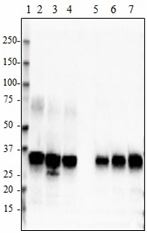
Western blot of purified anti-Apo E, 154-162 antibody (clone... 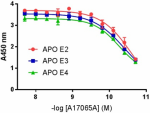
Direct ELISA of purified anti-Apo E, 154-162 antibody (clone... 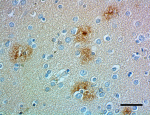
IHC staining of purified anti-Apo E, 154-162 antibody (clone... -
Biotin anti-Apo E, 154-162
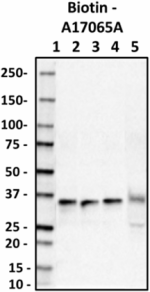
Western blot of Biotin anti-Apo E, 154-162 antibody (clone A...
 Login / Register
Login / Register 









Follow Us